Search the Special Collections and Archives Portal
Search Results

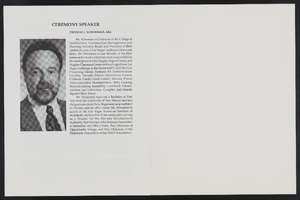

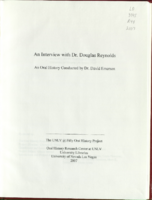
Transcript of interview with Dr. Douglas Reynolds by Dr. David Emerson, June 16, 2006
Date
2006-06-16
Archival Collection
Description
Professor Douglas Reynolds joined the engineering faculty in 1983. His credentials include a B.S. from Michigan State, M.S in mechanical engineering from Purdue, and a PhD in the same field, also from Purdue. Dr. Reynolds' work experience includes an assistant professorship at University of Texas a Austin (architectural engineering), associate professor in mechanical engineering at University of Pittsburgh, and a stint of industrial experience working for Caterpillar Tractor Company. He also worked as an acoustical consultant in Dallas, Texas. When interviewed at UNLV, Doug sensed that this was an opportunity to get in on the ground floor of a new engineering program and really have an impact on its development. He worked on the Engineering Advisory Committee and was given the task to justify the existence and growth of the engineering program at UNLV. He presented a report which documented the size and cost of the engineering building, and that report led to the existence of the building that can be found on campus today. With the building under construction, the engineering program itself needed accreditation with the American Board of Engineering and Technology. Dr Reynolds was responsible for documenting past, present, and future plans for the department courses and degrees. He also had to document a legitimate student graduation in order to apply tor accreditation. All this was accomplished in a short time, and the school received a very high evaluation. Dr. Reynolds' primary specialty is mechanical vibration and acoustics. He teaches machine design, kinematics and dynamics, and courses in mechanical vibration and acoustics. He wrote a textbook in the early 80's, "Engineering Principles of Acoustics." The updated revision will be completed soon, and he is also writing a new text entitled "Engineering Principles of Vibration". Douglas is chief U.S. delegate and chairman of the U.S. technical advisory group for ISO (International Standards Organization). He logs thousands of air miles every year on trips that are basically directed to research, bringing in research dollars, or are related to the standards work he does. His efforts on such a broad scale bring the UNLV engineering school national and worldwide exposure.
Text

Meeting minutes for Consolidated Student Senate University of Nevada, Las Vegas, March 25, 1996
Date
1996-03-25
Archival Collection
Description
Includes meeting agenda and minutes. CSUN Session 26 Meeting Minutes and Agendas.
Text
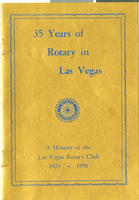
35 Years of Rotary in Las Vegas, 1923-1958
Date
1958
Archival Collection
Description
A history of the Las Vegas Rotary Club. 1923-1958
Text
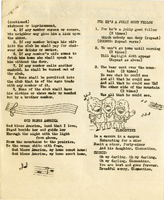
The Wheel of Rotary Las Vegas Rotary Club newsletter, September 8, 1949
Date
1949-09-08
Archival Collection
Description
Newsletter issued by the Las Vegas Rotary Club
Text
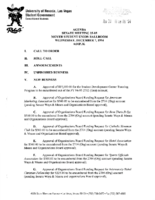
Meeting minutes for Consolidated Student Senate University of Nevada, Las Vegas, December 07, 1994
Date
1994-12-07
Archival Collection
Description
Includes meeting agenda and minutes. CSUN Session 25 Meeting Minutes and Agendas.
Text
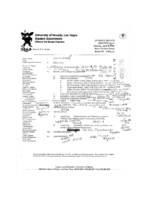
Meeting minutes for Consolidated Student Senate University of Nevada, Las Vegas, April 15, 1996
Date
1996-04-15
Archival Collection
Description
Includes meeting agenda and minutes. CSUN Session 26 Meeting Minutes and Agendas.
Text

Transcript of an interview with Kenneth Fong by Lois Goodall on February 22, 2014
Date
2014-02-22
Archival Collection
Description
Kenneth Fong reflects on growing up in Las Vegas and being the son of two successful and philanthropic community members, Wing and Lilly Fong. When Ken was born the family live in a modest home on 20th and Stewart. It was a close-knit neighborhood and era, kids played tag and roamed freely. When he entered third-grade, his parents moved their family to a newer subdivision near Rancho and West Charleston Avenue: the Scotch 80s. Their new custom home on Silver Avenue reflected Asian architecture and the family’s Chinese cultural heritage; it also included a pool and a small basketball court. Memories of the neighborhoods are distinct. He learned to be comfortable with his sister and he being the only Asian Americans in school at the time. He kept busy with community volunteering at Sunrise Hospital and tutoring younger children on the Westside among other high school activities. Ken speaks lovingly of his parents and their achievements, family outings to local venues such as Mount Charleston and Red Rock and to California, where they bought Chinese baked goods. His mother, Lilly was born into a large Chinese American family of ten children, each of whom achieved a college education. After her marriage to Wing, she moved to Las Vegas with plans to work as a teacher. Ken retells the story of her encounter with discrimination and overcoming that, and her trajectory to be the first Asian American elected the Nevada Board of Regents. His orphaned father, Wing, immigrated to the United Sates in 1939 to live with uncles. They worked as cooks in Las Vegas and established the first Las Vegas Chinese restaurant, Silver Café. Wing was merely thirteen years old and spoke no English. These were not to be obstacles. He would go on to graduate from Las Vegas High School, earn a college degree in business, have a successful career in commercial real estate and banking, building the notable Fong’s Garden. Ken calls his father his most influential mentor. Today Ken is also a successful in real estate management, active at Grace Presbyterian Church, involved in Rotary Club, and a proud father of two daughters.
Text
Pagination
Refine my results
Content Type
Creator or Contributor
Subject
Archival Collection
Digital Project
Resource Type
Year
Material Type
Place
Language
Records Classification
